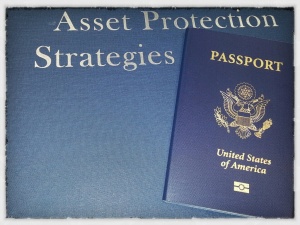The need for international asset protection has never been greater than it is right now. Lawsuits against high-net-worth individuals, high risk professionals, and entrepreneurs continue to proliferate. Government intervention allowing unprecedented control over individual wealth (e.g. The Patriot Act and NSA) has never been higher, and technology only compounds the problem. It has never been easier for a government bureaucrat to identify individual bank accounts, securities, and/or real estate and freeze those assets before any trial takes place.
The government can now make a presumption of guilt and freeze assets. Likewise, civil plaintiffs’ lawyers have lots of tools for discovering what you own and how you own it. These attorneys are highly motivated to take your wealth. International asset protection provides a solution to these problems.
International Asset Protection

Ignore the world of international asset protection at your own peril. The rest of the world is well accustomed to the concept of using international tools for the protection of wealth. Why aren’t we? The answer is that we’ve grown too comfortable at home. Our view isn’t as worldly as the views of Europeans, South Americans, Asians, and Australians who are constantly crossing borders. We’re happy dealing with local banks and domestic estate planning tools, but complacency has a significant cost.
The truth is that the United States has some of the best financial institutions in the world. That’s why so many people from other countries use the U.S. as their jurisdiction of choice for international asset protection. However, the problem with living in the land of the free and the home of the brave is that we have to give ourselves the option to move beyond the borders of the U.S. if we want the full benefits of international asset protection.
International asset protection is about legally diversifying your wealth. It’s not about secrecy or about hiding your assets (though it does provide A LOT of privacy). Rather, the aim of international asset protection planning is simply to separate your assets from your risk.
For example, if you are a doctor in the United States, then your risk of being sued exists in the United States. Doesn’t it make sense to consider the possibility of keeping your assets somewhere else? Wouldn’t it make sense to have the option to legally move your wealth to a jurisdiction that plays by a different set of rules than the legal system that will determine whether or not you are liable for causing injury to someone else or whether or not you breached a contract?
International Asset Protection Doesn’t Have to Be International
Great international asset protection doesn’t necessarily have to be international from the start, but an asset protection plan does need to be in place before a lawsuit or other claim is asserted against you. Think of international asset protection planning as preventative medicine and not as a cure for currently pending litigation. So long as you’ve done your planning in advance, an international asset protection strategy can actually be what we call a portable asset protection plan (click here to read about our portable offshore trusts).
That means that your asset protection plan can exist completely inside the United States with features that make it (and your wealth) completely and legally transferrable to an offshore jurisdiction even after a lawsuit is filed against you.
The benefits of international asset protection include:
- Privacy – Nobody will know what you have until you tell them.
- Control – The vast majority of my clients never lose control of their assets at any point in time.
- Diversification – If you only risk being sued in the U.S., make sure you have the option to quickly and legally move your assets to another country, where you have no risk of being sued.
- Ironclad protection – So long as your plan is set up as “preventative medicine,” it is the strongest form of protection available.
Once Your Plan Has Gone International
After a “triggering event” (e.g. potentially catastrophic lawsuit) has occurred and you’ve ported your asset protection plan to an international jurisdiction, the first thing you’ll want to know is “Will my money be safe offshore?” The answer is yes. None of my clients have ever lost money placed into foreign banks or assets held by the offshore trust companies we work with. Very simply, concern over foreign financial institutions is misplaced, and international asset protection is safe.
Once you’ve chosen to avail yourself of international asset protection laws, you’ll have your choice of banks. You can use any of the following:
- A bank in the jurisdiction of your international asset protection plan (most likely the Cook Islands, Nevis, or Belize);
- Banks located in major non-U.S. financial centers;
- Financial institutions located in the Cayman Islands (the world’s fifth largest banking center);
- European banks (many Swiss private banks are capitalized at 50% tier 1 capital ratios compared to U.S. banks which are almost always below 20%);
- Banks in the Far East (e.g. Hong Kong or Singapore).
